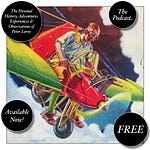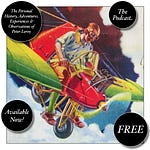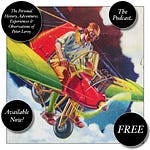Most children do not have a good sense of the amount of work required to build a radio from scratch or of the amount of time required to do it or—for that matter—of the passage of time itself. For most of them, time is like a dotted line, with unequal sections of the line itself (events) and unequal interstices (non-events, the periods of waiting for something to happen that make up much of a person’s childhood). I blame this misconception on the type of toaster used in most households: the pop-up toaster. In operating a pop-up toaster, one inserts a batch of bread (usually a slice or two) and lowers it into the toaster. For the child who watches this operation, the lowering of the bread is apparently the last event that occurs for some time, since the string of small events that add up to the toasting of the bread—the real work of toasting the bread—takes place out of the child’s sight. Therefore, the toasting itself becomes one of those interstices between events, a nonevent, a period of waiting that varies, both in real and in apparent length, according to the hunger of the child, the thickness of the bread, and random fluctuations in the voltage of the electrical service to the toaster. When the toast pops up, the child at last witnesses another event, which terminates the period of waiting for something to happen.
What effect, we might ask ourselves, does the pop-up toaster have on the intellectual development of the child who sits beside it, morning after morning, waiting with his plate and peanut butter? Bread goes in as bread and comes out, after an interval, as toast. Put in bread. Wait. Get out toast. Surely, the child who watches this happen over a period of time comes to think of bread as either bread or toast, to think of time as discrete intervals, and to think of being as being in some one form or in some other, with intervals of waiting, intervals between states when, apparently, nothing happens. Such a child would ask his grandfather to build him a radio (that is, lower the bread into the toaster), wait for some interval, and then expect his grandfather to hand him a radio (that is, expect the toast to pop up). When they grow up, these children are immediately attracted to the quantum theory, digital watches, and electronic calculators.
I was not such a child, because Gumma and Guppa did not have a pop-up toaster. Their toaster was a chrome-plated metal box about as long as three slices of bread lined up side by side. At each end of the box was a slot a little higher than the height of a slice of bread and a little wider than the thickness of a slice of bread. Inside the box was a tunnel through which the toast moved from the left end of the toaster to the right. Along the bottom of the tunnel was a set of toothed rails linked by an armature to a motor. The motor made the rails raise the toast, move it a short distance to the right, and set it down again on the stationary base rail. On either side of the tunnel were resistance wires that provided the heat to toast the bread. Little by little, as the bread marched through the toaster, it browned; that is, it became toast.
Now here comes the best part. The manufacturer of this toaster, clearly nobody’s fool, had provided a small circular window in the side, so that one could watch the rhythmic rightward shuffle of the slices of bread and their progress from bread to toast.
From a very early age, I loved watching—and listening to—the operation of this toaster. As the toaster operated, it produced a repetitive sound from somewhere inside the machine, from the scraping of some parts against others, a sound that I interpreted as words, the words Annie ate her radiator, repeated over and over while the bread toasted. I would sit and watch and listen to the toaster and watch the bread through the little window and try to decide where in its passage from left to right it became toast. And from that toaster I learned to think of time as a belt, to think of being as being in transit, and I laid the groundwork for a persistent nostalgic affection for the wave theory of electromagnetic radiation and round-faced watches and slide rules, and I developed a sense of time’s passing.
During the forty-six weekends that I had so far spent with Guppa in the cellar working on the receiving set (not counting the time that we had spent pumping the cellar out and drying its contents after the flood in November), my sense of the passing of time had developed to a point where, although it may not have been as acute as my sense of sight, it was at least as sharp as my sense of smell.
When Guppa and I had begun work on the receiving set, we had, each in his mind’s eye, pictured a similar tableau: grandfather and grandson bent to the work together, youth and age, experience and enthusiasm, harnessed in tandem. We had glowed for a while with the flush of a mutual overconfidence in what an enthusiastic grandson might be able to accomplish, guided by his grandfather’s hand. That glow had faded pretty early in the course of the work, as soon as we had come to see that there was very little that I could do that Guppa would not have to undo or redo later. My helping had degenerated into my keeping out of Guppa’s way and keeping him company, demonstrating by my presence, and by displays of enthusiasm, that I was grateful for the effort that he was making, that I was impressed as could be by his stick-to-itiveness, and that I was still crazy about the idea of having a shortwave receiving set, although in fact I had begun to think, halfway through our third day in the cellar, that I would have been a lot better off if I had asked Guppa to make me something quick and simple, like a scooter, just as I was sometimes struck by the thought, while watching a slice of white bread move through the toaster, that I would rather have had raisin bread.
Next episode:
Have you missed an episode or two or several?
You can listen to the episodes on the Personal History podcast from the beginning or scroll through the episodes to find what you’ve missed.
You can begin reading at the beginning or you can catch up by visiting the archive or consulting the index to the Topical Guide.
At Apple Books you can download free eBooks of “My Mother Takes a Tumble,” “Do Clams Bite?,” “Life on the Bolotomy,” “The Static of the Spheres,” and “The Fox and the Clam,” the first five novellas in Little Follies.
You’ll find an overview of the entire work in An Introduction to The Personal History, Adventures, Experiences & Observations of Peter Leroy. It’s a pdf document.
















Share this post